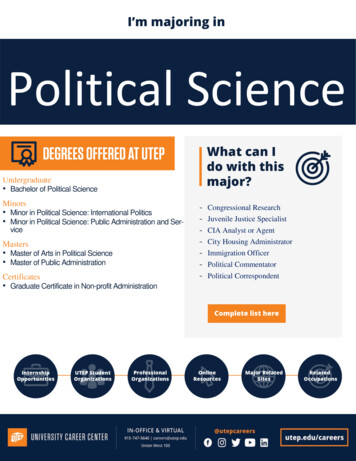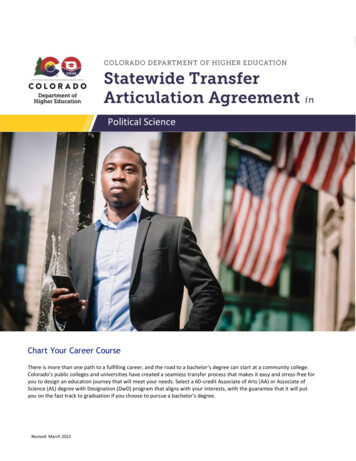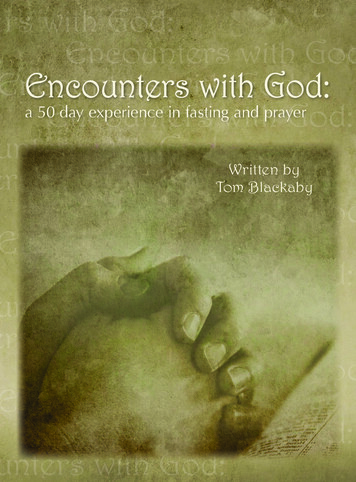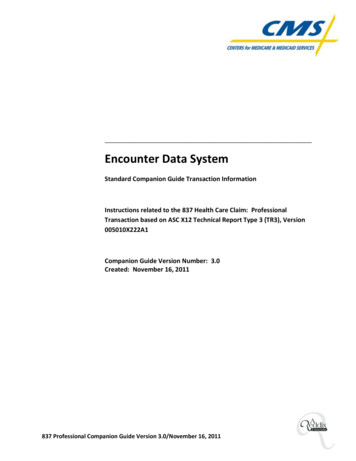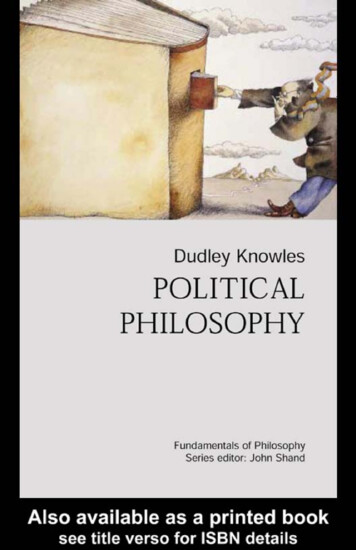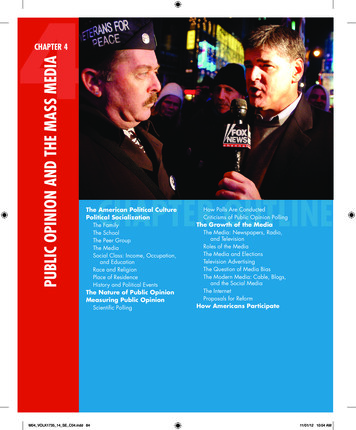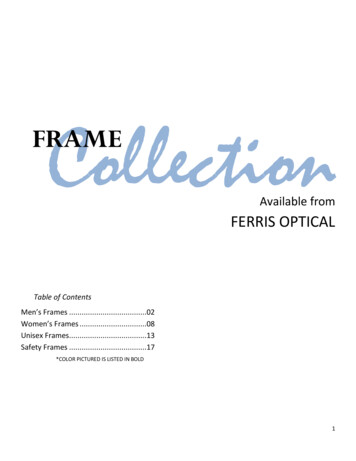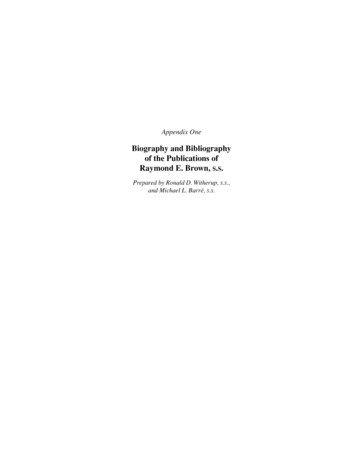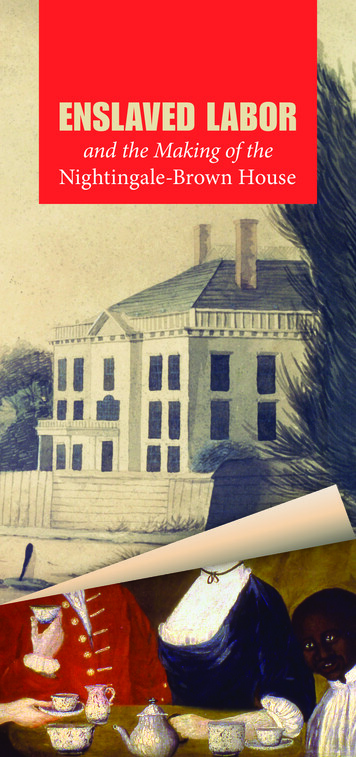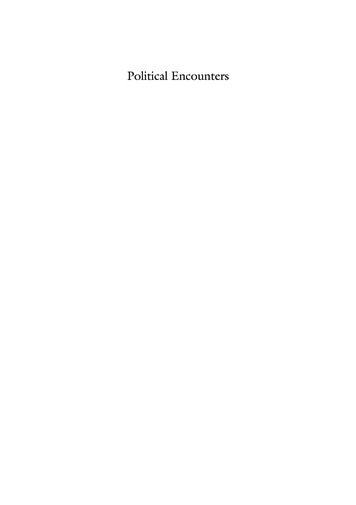
Transcription
Political Encounters
Ruairidh J. BrownPolitical EncountersA Hermeneutic Inquiry into the Situationof Political Obligation
Ruairidh J. BrownUniversity of Nottingham NingboChinaNingbo, Zhejiang, ChinaISBN 978-3-030-17339-5ISBN 978-3-030-17340-1 (eBook)https://doi.org/10.1007/978-3-030-17340-1 The Editor(s) (if applicable) and The Author(s), under exclusive license to SpringerNature Switzerland AG 2019This work is subject to copyright. All rights are solely and exclusively licensed by thePublisher, whether the whole or part of the material is concerned, specifically the rightsof translation, reprinting, reuse of illustrations, recitation, broadcasting, reproductionon microfilms or in any other physical way, and transmission or information storage andretrieval, electronic adaptation, computer software, or by similar or dissimilar methodologynow known or hereafter developed.The use of general descriptive names, registered names, trademarks, service marks, etc. in thispublication does not imply, even in the absence of a specific statement, that such names areexempt from the relevant protective laws and regulations and therefore free for general use.The publisher, the authors and the editors are safe to assume that the advice andinformation in this book are believed to be true and accurate at the date of publication.Neither the publisher nor the authors or the editors give a warranty, expressed or implied,with respect to the material contained herein or for any errors or omissions that may havebeen made. The publisher remains neutral with regard to jurisdictional claims in publishedmaps and institutional affiliations.Cover image: Maram/shutterstock.comThis Palgrave Macmillan imprint is published by the registered company Springer NatureSwitzerland AGThe registered company address is: Gewerbestrasse 11, 6330 Cham, Switzerland
For Grandad
AcknowledgementsThe core concept of this book—the idea of the ‘encounter’ as a meansof studying the relationship between citizens and States—has its genesis in my research proposal for a Ph.D. at the University of St Andrews,written in the winter of 2012. I would subsequently first thank myPh.D. supervisor Dr. Gabriella Slomp. I was truly blessed to have suchan encouraging and invested supervisor. I would also like to thank mysecond supervisor Professor Patrick Hayden for both his continual support and advice as well as the invaluable insight he provided into politicalexistentialism. Both Gabriella and Patrick I feel went beyond the call ofduty in the advice and assistance they offered during my Ph.D. years, andindeed since, for which I am eternally grateful. I would also here like tothank my two Ph.D. examiners, Professor John Horton and ProfessorTony Lang. I was in particular very fortunate—and honoured—to haveJohn, one of the leading experts on the subject of Political Obligation,as my external examiner. It was also John who pressed me in viva examination on the potential dangers of my project in relation to the risingconcern of Post-truth, a potential line of critique which has since greatlyinfluenced this work, and for this, I am incredibly grateful. I would alsolike to thank more widely all the staff at the University of St Andrews.I do not believe there is any better incubator for philosophical thought.I was also very fortunate to be part of an incredibly special MLitt Class—International Political Theory 2012/2013—whose comradeship then,and since, has been an invaluable source of intellectual nourishment. Toall of them, thank you.vii
viiiAcknowledgementsI would also like to thank Palgrave Macmillan for helping make thisbook a reality. I would in particular like to thank Michelle Chen andJohn Stegner. I would in particular like to thank Michelle for support andenthusiasm for this project when I first pitched her this book. Indeed, Iwould like to thank Palgrave Macmillan overall for being a pleasure towork with.It is perhaps cliched to thank one’s students, but nonetheless, I cannotstress the truth in the belief we can learn as much from teaching classesas they can from listening to us. The following discussion on Marxismhas, for instance, largely been shaped by the many classes I have givenover the last five years. Thus, to all the students I have taught, and thestaff I have worked alongside, at the Universities of Stirling, St Andrews,and Nottingham Ningbo, as well as the Oxbridge Academic SummerSchool programs, I say thank you. I would also like to thank JohnDourneen who very kindly took the time to carefully look through themanuscript on the eve of the deadline.Finally, I would like to thank my entire family who has stood byme over the years. I must thank my mother and father, Anne and IvorBrown, for their continual support. I would also like to thank my lategrandfather Michael McMichan, who passed away in December 2017,for never tiring in his enthusiasm to debate with me all things historical,philosophical, and political. Finally, greatest gratitude goes to my wifeKimberly.
Contents1Introduction: The ‘Situation’ of Political Obligation 11.1 Political Obligation31.2 The Modern State81.3 Hermeneutics131.4 Plan of This Book18References202The ‘Rational Individual’: Rational Paradigmsof Obligation 232.1 Rationalism and Political Obligation242.2 T. H. Green’s Teleological Theory: A Rational Approach342.3 The Strengths and Limitations of a Normative RationalParadigm402.4 Rationalism and Obligation in the Scottish Legal System46References543The Importance of Tradition and Culture:Context-Based Paradigms of Obligation 573.1 Conservatism and Communitarianism583.2 Associative Political Obligation: A Context-BasedApproach643.3 Confucian Communitarianism: The Context-BasedApproach in China72ix
xContents3.4 Traditional Culture, Obligation and the Chinese StateReferences79844The Oppressor and the Oppressed: Marxist and OtherCritical Paradigms of Obligation 874.1 The Marxist Critique of Obligation884.2 Beyond Class: A Gender-Based Criticism of Obligation944.3 The Problem of ‘False Consciousness’ and the Limitsof the Critical Approach1004.4 Gender and Obligation in the USSR104References1115The View from Inside: Introducing the HermeneuticalConcept of Encounter 1135.1 The Encounter1155.2 Horizon1235.3 l Obligation in a Post-truth Era: Limitations,Critique and a Defence of the Approach Through theEncounter 1817.1 The Spectre of Post-truth1827.2 The Hermeneutical Approach Through the Encounter:A Post-truth Theory?1887.3 The ‘Encounter’ and Possible Future NormativeAssessment193References202Encounter and Obligations 147Encounter, Friendship, and Obligations150The Encounter with ‘The Enemy’160The Encounter and Political Obligation166The Encounter as a Hermeneutic Tool for Uncoveringand Interpreting Ideas and Narratives of PoliticalObligations175References178
Contents8xiConclusion 203Reference207Index 209
x CONTENTS 3.4 Traditional Culture, Obligation and the Chinese State 79 References 84 4 The Oppressor and the Oppressed: Marxist and Other Critical Paradigms of Obligation 87 4.1 The Marxist Critique of Obligation 88 4.2 Beyond Class: A Gender-Based Criticism of Obligation 94 4.3 The Problem of 'False Consciousness' and the Limits
